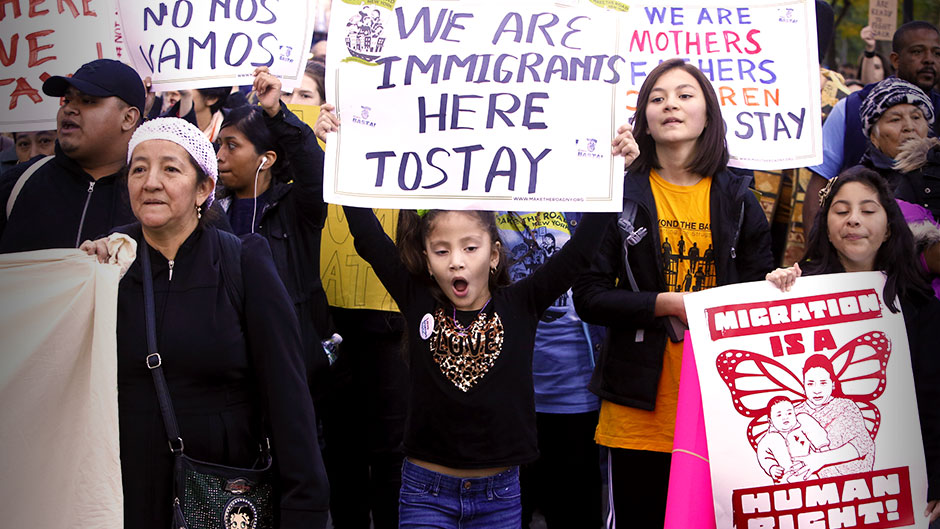When 39-year-old Jorge Garcia was deported from Detroit to Mexico in January, the family of the landscaper was devastated. He had spent 30 years in the U.S. but the undocumented immigrant was sent back to Mexico due to what some view as the government’s unnecessary stricter enforcement policy.
Besides leaving behind a broken family, the surrounding neighborhood of Lincoln Park, where Garcia lived and worked, was also affected. Deportation affects entire communities in the United States, according to the Society for Community Research and Action, a division of the American Psychological Association that has issued a statement calling for the U.S. to make changes.
The statement is a thorough examination of research that was drafted by Ashmeet Oberoi, clinical assistant professor and director of the community and social change master’s program at the University of Miami School of Education and Human Development (SOEHD), along with six other academics.
“When families are torn forcibly apart the negative effects are long lasting for everybody,” said Oberoi. “Not only are immigrant communities affected but so are broader communities because it creates a sense of mistrust and interferes with people’s sense of belonging in their community.”
Based on an examination of three decades of U.S. immigration protocols, the statement details the psychological and economic impacts of deportation on children and families, as well as broader community consequences that unfold as immigrants fearful of being targeted withdraw from civic engagement in churches, schools and community groups.
Oberoi and her coauthors underscore the psychological trauma and material hardship experienced by U.S.-born children of immigrants, and the number of people impacted by current deportation policies, before recommending changes to federal and local laws. Among their conclusions:
- Studies reveal that children who lose a parent to sudden, forced deportation experience anxiety, anger, aggression, withdrawal, a heightened sense of fear, eating and sleeping disturbances, isolation, trauma and depression.
- Children also experience housing instability, academic withdrawal and family dissolution; older children often need to take on jobs to help support the family.
Changes to U.S. immigration policy over the last 30 years have resulted in a massive increase in deportations—and a marked shift away from post-World War II-era policies that focused on family reunification, the authors found.
- From 1900 to 1990, approximately 20,000 people were deported each year. In the mid-1990s, the rate increased by 800 percent to 180,000 a year—and has since more than doubled to 340,000 deportations in 2017.
Deportations become a public health issue as feelings of belonging and connection are broken down, said Oberoi.
“It has also been documented that when adults are emotionally affected by threats of deportation, they experience sadness, fatigue, nightmares and anxiety,” she said. “It has also been found that chronic psychological stress which is associated with fear of deportation for one self or family members is also related to cardiovascular risk factors.”
The effects are sufficiently widespread and dire that Oberoi and her coauthors outline several national and local-level policy recommendations to alleviate suffering among U.S.-born children, beginning with comprehensive immigration reform that would end the threat of deportation by providing permanent protection for 11 million people who lack authorization to remain in the United States. Their "child-first" recommendations also include:
- No forcible separation of families
- Modify laws to allow extended family caregivers, such as grandparents, to qualify for exemption from deportation
- Take a public health perspective on deportation, recognizing the direct and indirect impacts on community members
- Create a human rights framework in U.S. immigration policy
- Local jurisdictions should declare themselves sanctuary cities to enhance the protection of unauthorized immigrants and their families, and they should not detain or deport people solely for immigration violations.
- Local school districts should communicate with their communities and prioritize safety and inclusion for all immigrant families, including building a protocol for responding to federal immigration activity near schools and educating school personnel on the effects of immigration enforcement.
- Schools, places of worship, and community organizations must build supportive social networks that create a sense of belonging among families that are coping with the effects of deportation.
Oberoi’s coauthors on the "Statement on the Effects of Deportation and Forced Separation on Immigrants, their Families, and Communities," are Regina Langhout, principal investigator from the University of California, Santa Cruz; Sara L. Buckingham, University of Alaska at Anchorage; Noé Rubén Chávez, City of Hope Medical Center; Dana Rusch, University of Illinois at Chicago; Francesca Esposito, Instituto Superior de Psicologia Aplicada—Instituto Universitário; and Yolanda Suarez-Balcazar, University of Illinois at Chicago.

